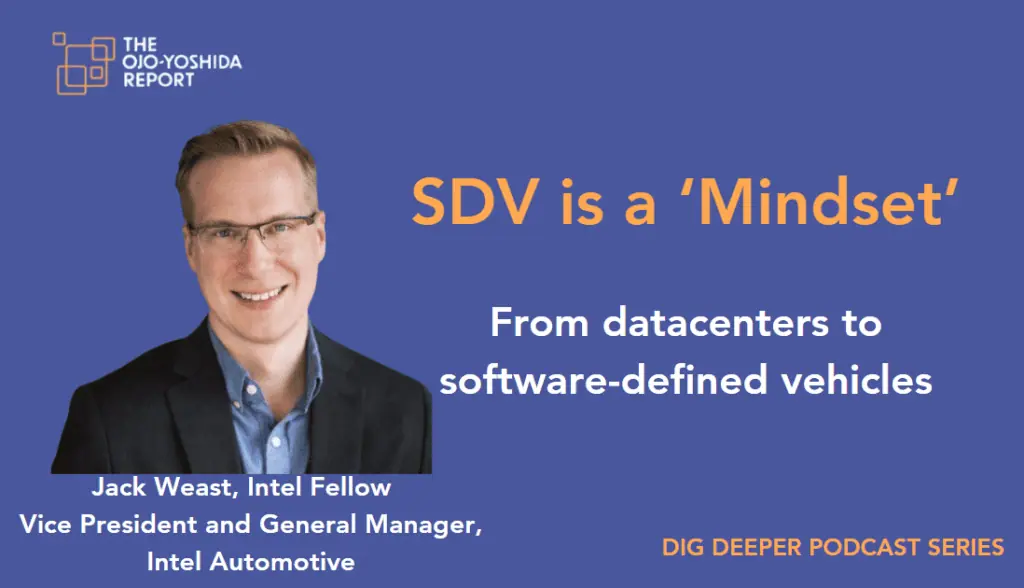
Western reporters and analysts covering the automotive industry tend to struggle nowadays with two mysteries: 1) What’s going on in China? and 2) What’s Intel doing in automotive? The latter riddle is all the more cogent since Intel spun out Mobileye and took it public in 2022.
The Ojo-Yoshida Report’s upcoming Episode 2 of Dig Deeper Software Defined Vehicles (SDV) series is the ideal primer for amateur detectives puzzling over both mysteries. Chances are that you’re likely to kill two birds with one stone.
Jack Weast, Intel Fellow and now vice president and general manager of Intel Automotive, is the featured guest of this SDV episode. After moving, with his wife, to Beijing in March, Weast has thrown himself into the hottest automotive revolution going on in China.
For a big corporation like Intel, which has dipped its toe more than a few times in the automotive market, this plunge is a bold move.
In our interview, Weast said, “I still have the same global responsibility to run the business and serve our customers around the world.” But “to work closely with your customers here [in China] to really figure out what the future of the industry looks like, you can’t do that from the West Coast — from halfway around the world. You’ve got to just be in it.” He acknowledged that Intel is beefing up its engineering team in China to support Chinese automakers.
This video podcast focuses on software-defined vehicles. Earlier this year, during Intel Automotive’s inaugural keynote at the Consumer Electronics Show, Weast famously defined one of Intel Auto’s objective as “SDV done right.”
Weast calls SDV not a feature, but a mindset. If so, what’s Weast’s definition of SDV? How are other companies getting it wrong?
Weast stressed that Intel is developing software defined architecture “for the whole vehicle.” This poses questions about Intel’s breadth of components, ranging from high-performance compute silicon to domain and microcontrollers. If Intel’s got them, what do they look like?
Intel says that the company is bringing its data center experience to software-defined vehicles. What does Weast mean by that?
Intel doesn’t just design — it also fabricates — its chip. How are automakers responding to Intel’s revamped chip production strategy, both in the United States and in Europe? Is it well received?
Obviously, given that China is full of EV upstarts barging suddenly into the automotive market, China is a green field, a factor that seems to favor Intel’s initiative. After all, Intel, too, is a newbie in automotive chips.
In our podcast, we ask all these questions and ask what SDV plans Intel is proposing to Chinese OEMs and Tier Ones.
Episode 2 will go on air at 9:00AM PT, Wednesday, June 5. Please reigster to save your seat. You can’t attend the live event? Don’t worry. Please register so that we can send you an on-demand link, after the event.
Below is a list of Dig Deeper on SDV series (the first three episodes) scheduled with associated links for registration.
Phil Amsrud, associate director, Automotive, S&P Global Mobility, will set the stage with an overview of software-defined vehicles, including solutions to mysteries like: What is it? Who’s it for? and Why do we need it?
Episode 1, put on air Wed., May 29 is now available for play back. For on-demand playback, first Register for Episode 1
Jack Weast, Intel Fellow and VP and GM at Intel Automotive, will discuss why Intel is back in the automotive market, and how the processor giant believes it can leverage its data center experience to SDVs. Episode 2 is a unique opportunity to hear from Weast, who’s now shepherding Intel’s global automotive business from Beijing.
Episode 2: 9:00AM PT, Wed., June 5 Register for Episode 2
Phil Koopman, safety expert and Carnegie Mellon University professor, discusses “Two Sides of the SDV Coin.” Before they update software in millions of cars, Koopman asks SDV designers and suppliers his trademark question: #Didyouthinkofthat?
Episode 3: 9:00AM PT, Wed. June 12 Register for Episode 3
Junko Yoshida is the editor in chief of The Ojo-Yoshida Report. She can be reached at junko@ojoyoshidareport.com
Copyright permission/reprint service of a full Ojo-Yoshida Report story is available for promotional use on your website, marketing materials and social media promotions. Please send us an email at talktous@ojoyoshidareport.com for details.
